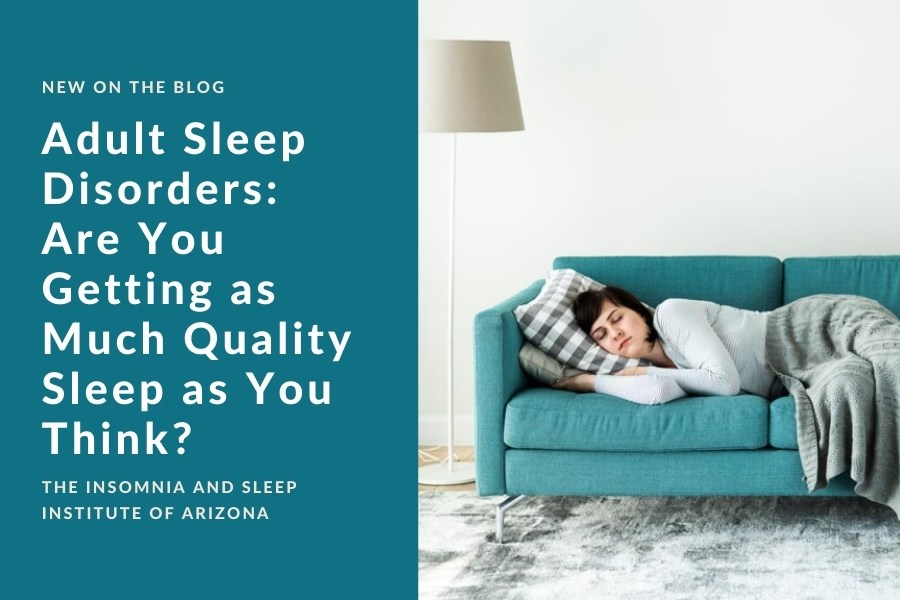At The Insomnia and Sleep Institute of Arizona, we treat both adults and patients as young as two years old. Proud to be voted “Top Doc” in the Phoenix region for the past six consecutive years, we are an outcome-focused sleep clinic where every initial consultation is with a sleep specialist who can diagnose patients in order to create a strategy for testing and treatment. Here, you get unprecedented staffing levels including three sleep specialists, a physician assistant with a Masters in Sleep, respiratory therapists, nurse practitioners with sleep medicine training, and a clinical psychologist who specializes in CBT for insomnia. Although we treat pediatric patients, the majority of people with sleep disorders are adults.
If you’re an adult struggling with a sleep disorder in Phoenix, you’re not alone. Millions of people in the U.S. alone have one or more sleep disorders, such as insomnia or sleep apnea. Many more go undiagnosed. This is sometimes due to the fact that people notoriously overestimate how much sleep they get and particularly err in the quality of sleep that they get.
Millions of Adults & Sleep Disorders
According to researchers at the Outpatient Clinic for Sleep Disorders and Sleep-Related Disorders, “patients’ own impressions of their sleep behavior is often quite different from that demonstrated by clinical measurements.” There’s a new research group that analyzed a patient’s real sleep time with what they self-reported, as well as a number of complementary factors. The full results are in the Journal of Clinical Sleep Medicine. In total, patients were monitored from 2012 – 2016 and the study included 303 people. Among the patients, half were women and 32 percent had diagnosed insomnia while 27 percent had sleep-related breathing disorders such as sleep apnea. Additionally, 15 percent had sleep-related movement disorders, 14 percent had hypersomnia, and 12 percent had some type of parasomnia.
The study revealed that there was quite a large discrepancy when comparing the self-reported sleep and the factual sleep, regardless of the disorder. However, insomnia patients had the largest discrepancy no matter the age or gender, and regardless of whether the sleep occurred in a sleep lab or at home. The majority of insomnia patients in the country are adults, and insomnia is one of the most common adult sleep disorders. Researchers reveal that insomnia patients tend to overestimate sleep latency as well as “significantly underestimate” how much total sleep time they get. One factor that might be the cause is a routinely elevated level of background stress (known as hyperarousal). There is also the fact that insomnia is regularly linked to psychiatric correlations (such as depression and anxiety), although insomnia can also present without any mental health comorbidities.
Other Adult Sleep Disorders
Insomnia is a bit unique in this study because those with other sleep disorders underestimate sleep latency and tend to overestimate how much sleep they get. Overall, this study supports other related studies that have already taken place. However, the lead author notes, “By incorporating this misperception into behavioral therapy [such as CBT], we can significantly improve treatment outcomes.” Cognitive-behavioral therapy, or CBT, is the gold standard in treating insomnia at The Insomnia and Sleep Institute. Insomnia diagnoses have soared in the past year due in large part to COVID-19 stress, and other studies have shown that adults are increasingly reaching for medication to treat what is often chronic insomnia lasting three or more months.
If you have a sleep disorder, working with a sleep specialist is the best and safest way to manage or treat this issue. Consultations are only with sleep specialists, so you know you will get a correct diagnosis first. As the Face of Sleep Medicine in Arizona, we are proud to serve you and help you achieve the sleep you need to be your best. There are many types of sleep disorders, and although insomnia and obstructive sleep apnea are the most common in adults, we are here to treat all of your sleep issues and disorders.
No referral is needed for a consultation and treatment at The Insomnia and Sleep Institute. To get started on your better sleep journey, connect with us today and schedule your consultation with a sleep specialist. You can simply fill out the online form or call the office directly.





